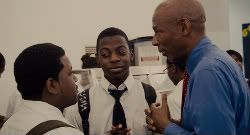
Maybe it’s just this year, or this fragile socio-economic time we’re living in (of course, when hasn’t there been a fragile socio-economic time), but there seems to be a real shift in the culture of documentaries going on in this country. More than ever before, we are seeing documentary features—and really good ones at that—that are about current issues. Documentaries used to be about historical events or biographies of dead people. But that seems to be changing. Maybe it’s the heightened awareness we all have of issues because of the immediacy of the internet and the 24-hours news cycle, but, whatever it is, we are caring more about the issues around us now than ever before. This emotional and intellectual urgency is reflected in the documentaries that are getting made (and getting honored). While it’s true that only four of the last 20 winners for the Oscar for Best Documentary Feature have been about current events, those four have all been in the last 6 years.
The last four current issues that were explored by Oscar-winning documentaries were the dolphin slaughter in Taiji, Japan (The Cove), global warming (An Inconvenient Truth), the lives of poor children in Calcutta (Born Into Brothels), and the torture practices in Iraq and Afghanistan (Taxi to the Dark Side). It’s far from time to crown this year’s winner for Best Documentary, but 2010 seems to already be a banner year for more quality documentaries that tackle current issues.
Documentaries in general are showing a resurgence in the amount of mainstream attention they are receiving. Already, the documentaries Restrepo, The Tillman Story and Joan Rivers: A Piece of Work have garnered considerable acclaim and there is great anticipation for the soon-to-be-released Client 9: The Rise and Fall of Eliot Spitzer. Even fake documentaries have been the talk of the town this season, as I’m Still here, Catfish and Exit Through the Gift Shop, which all blur the lines between fiction and fact, are the buzz of the festival circuit. But it is Waiting for “Superman” and Inside Job that lead the way for documentaries in 2010, and understandably so. Each of them tackles an important current issue and presents it in a cohesive, entertaining and thought-provoking way, although one hits on one more key ingredient: emotion.
Waiting for “Superman” is the documentary to see this year. An examination and excoriation of the American public education system, this film from director Davis Guggenheim (An Inconvenient Truth) does everything a good documentary should do: it engages, it enrages and it enlightens. Like with any other film, a documentary can only work if it tells a story. Waiting for “Superman” actually tells 6 different stories: 5 different under-privileged kids who want a decent education and the over-riding, much more painful story of the American educational system, which is unbearably broken. Guggenheim weaves together the stories of each of these kids so well, building to a climax that will tease and torture you, as each of them sees their futures held in a single bouncing lottery ball. Guggenheim understands that, no matter how important a documentary’s subject may be, it can only succeed if it connects with the audience. These days, it’s hard to convince people to watch a documentary if they feel they are going to be lectured for two hours, so documentary filmmakers have a tough line to tread. They have to find a way to get an important message across in a subtle and entertaining way. Not an easy feat. But Guggenheim succeeds as he crafts an entertaining, educational and moving portrait of our society. It helps that he has a background in television, having directed for such series as Deadwood, 24 and ER, because his ability to craft tension is obvious.
But the real tension in this film is in the truths that are revealed. Our educational system is failing our children and the way this film breaks it down and explains how and why is shattering. There are those in this film who will inspire you and there are those that will infuriate you. But the most important thing this film gives you is a better understanding of what is happening and how it can and should be fixed. This is what documentaries are all about. I highly encourage everyone to see it.
 Likewise, Inside Job is a film everyone should see, but for different reasons. Inside Job does not strike an emotional chord, as its predecessor, Michael Moore’s Capitalism: A Love Story tried to do. Instead, Inside Job presents a rational, methodical and basic presentation of the facts behind the 2008 economic meltdown. Its style is much more classroom than showroom, but that’s probably because of the subject matter more than anything. This is a movie about how Wall Street works. And I don’t know about you, but that’s something I’ve never really understood. All this stuff about bulls and bears and trades and derivatives always made my head spin. And that’s what Wall Street counts on. They want the ordinary citizen to have no idea what they are doing. And more important than that, they don’t want the ordinary citizen to know what they are doing with THEIR money. And that’s the core issue and what Inside Job focuses on. Wall Street was playing with our money and they lost. No, wait…we lost.
Likewise, Inside Job is a film everyone should see, but for different reasons. Inside Job does not strike an emotional chord, as its predecessor, Michael Moore’s Capitalism: A Love Story tried to do. Instead, Inside Job presents a rational, methodical and basic presentation of the facts behind the 2008 economic meltdown. Its style is much more classroom than showroom, but that’s probably because of the subject matter more than anything. This is a movie about how Wall Street works. And I don’t know about you, but that’s something I’ve never really understood. All this stuff about bulls and bears and trades and derivatives always made my head spin. And that’s what Wall Street counts on. They want the ordinary citizen to have no idea what they are doing. And more important than that, they don’t want the ordinary citizen to know what they are doing with THEIR money. And that’s the core issue and what Inside Job focuses on. Wall Street was playing with our money and they lost. No, wait…we lost.
So who was at fault? How did a global economic meltdown happen? Inside Job does a good job at presenting the facts, although there are times that I did get lost. But, nonetheless, the messages are clear and the tone is consistent throughout. Matt Damon’s narration provides just enough comfort to help us endure a film about how stupid all of us were—and still are, until we wake up and smell the corruption.
Waiting for “Superman” and Inside Job are probably two of the scariest films you’ll see all year. Maybe ever. But they, like An Inconvenient Truth, are films that we should not and cannot ignore. Yes, we all like to be distracted by mindless entertainment when we go to the movies, but, sometimes, we need to pull our heads out of the sand and take a good look at the world around us. If it weren’t hard, it wouldn’t be worth doing.
